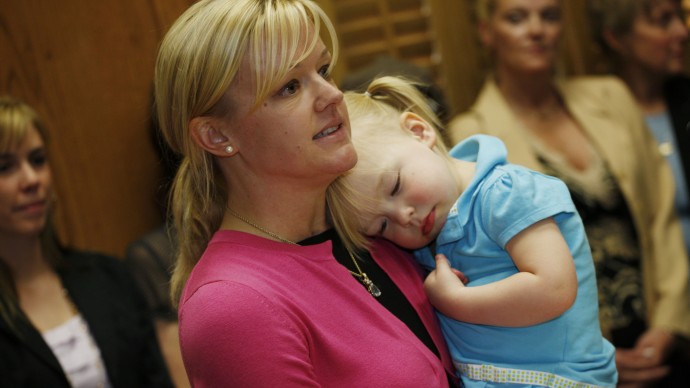It comes as no surprise that stoners and hippies alike champion the legalization of medical marijuana, but there is a new advocate who may come as a surprise.
Videos by Rare
Known as the “mommy lobby,” these concerned mothers across American are seeking out ways to help their children cope with medical disorders where doctor-prescribed medicine has failed.
Moms have long been a politically active bloc, and are fierce to protect their children. Whether it be Moms Against Drunk Driving, or the stroller brigade of moms against chemicals, or even mothers lobbying for more gun control after the Sandy Hook tragedy, moms play a powerful force in the political arena.
Meet Sally Schaeffer of Wisconsin. As the Washington Post reports, her daughter was born with a rare chromosomal disorder that give her life-threatening seizures. Despite countless medical treatments from doctors, nothing has been able to stop the seizing.
Schaeffer now advocates for Wisconsin to make medical marijuana legal.
“If it was your child and you didn’t have options, what would you do?” she begged the state legislature during a hearing on Feb. 12.
Her testimony prompted state representatives to introduce a bill to allow medical marijuana for people in a similar situation to Schaeffer’s.
As national opinion about legalizing marijuana eases, more advocates are coming forward and making the case for legalized medical marijuana.
In the documentary “In Pot We Trust,” Jacqueline Patterson, who has cerebral palsy, displays the soothing effects of marijuana. Before she smokes, she twitches and stutters and is unable to do normal tasks. Once she smokes, she is calmer, noticeably in less pain and able to function normally.
Without marijuana, Patterson says she wouldn’t be “half the mother” she is for her children.
There has been recent movement for states’ to legalize marijuana, even in conservative states like Georgia, Utah, Alabama and Kentucky.
Much of the medical community is divided on the issue.
“It is a bad idea. When I look at the accumulation of studies about marijuana and children, I am very concerned,” Sharon Levy, an assistant professor of pediatrics at Harvard Medical School, told the Post.
“We shouldn’t forget that the regulatory system was put in place for a reason,” she added. “The history of medicine is littered with stories of ‘medications’ that had terrible long-term impacts.”
Still, other doctors have come out and said just the opposite.
“I mistakenly believed the Drug Enforcement Agency listed marijuana as a schedule 1 substance because of sound scientific proof. Surely, they must have quality reasoning as to why marijuana is in the category of the most dangerous drugs that have ‘no accepted medicinal use and a high potential for abuse,'” CNN’s chief medical expert Sanjay Gupta said last fall.
“They didn’t have the science to support that claim, and I now know that when it comes to marijuana neither of those things are true. It doesn’t have a high potential for abuse, and there are very legitimate medical applications. In fact, sometimes marijuana is the only thing that works.”



